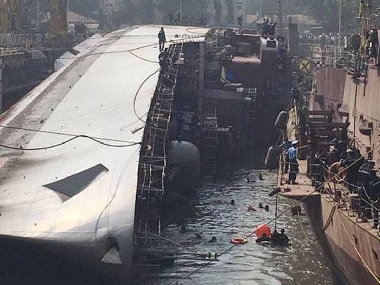Accidents happen. But ships, especially major naval vessels do not fall on their sides like beached whales.
Yachts collapse. Little fishing boats might keel over. A canoe can overturn. Ride the rapids and your rubber dinghy might flip.
But to have a 126-metre frigate topple over in dry docks is unbelievable. It is not only unbelievable, it is incomprehensible.
That two sailors were killed makes it manslaughter by neglect.
Does anyone know what the size and weight of a warship of this genre is? For one, it is over 4,000 tonnes when loaded and has a crew of 450 people officers and men and is literally a floating township with aircrew for choppers. The INS Betwa is a Brahmaputra class guided missile frigate.
That is no little ketch.
Now she lies on her side, like a crumpled can in the naval dockyard in Mumbai.
They say she slipped from her dock blocks. Technically, that cannot happen unless there was a change in the centre of gravity, the blocks were loose or malfunctioning or what should be a normal operation was so botched up that a lot of somebodies did not do the calculations and were cavalier about it.
We have lost ships before. The INS Khukri went down in 1971, ostensibly victim to an aided attack from Pakistan. We have lost several ships including the INS Andaman because she was not seaworthy. In 2014, there were a spate of incidents when there were 11 separate incidents resulting in the loss of 22 lives, forcing the then naval chief Admiral DK Joshi to do the most honourable thing and resign by taking responsibility like a good sailor should. It set a precedent in grasping the nettle in the truest traditions of the navy.
Clearly, it was a sacrifice in vain. For such an accident to occur, short of some bizarre genie coming out of a bottle and casting an evil spell there is just no reasonable explanation for such an unprecedented collapse of a vessel this size in a dry dock. While the eggheads can do their maths and figure out exactly what caused the ship to topple over, there has to be a thorough investigation of the strength and maintenance of the dock itself and whether procedures were followed.
Elements like docking position, docking drafts, docking displacements, docking conditions and shipyard docking plans are all integral to such an undertaking. All these should be really routine.
Most accidents that occur in dry docks are slips and falls because of worker error, fires and loading accidents or equipment malfunction.
But to have a whole ship that size fall off is almost unheard of in these hi-tech times.
The most generous explanation that can be given is: This is embarrassing, it simply does not happen.
Even freak accidents would not account for such an occurrence.
Clearly, this was not a singular error. Just like with most aircraft accidents that defy the norm, the INS Betwa fell victim to a series of slip-ups and goof-ups, not just one. It is always one thing that leads to the next and then the domino principle kicks in and you have a frigate on its side with no way of lifting her up.
And worse, two deaths as a result of incredible negligence.
)
)
)
)